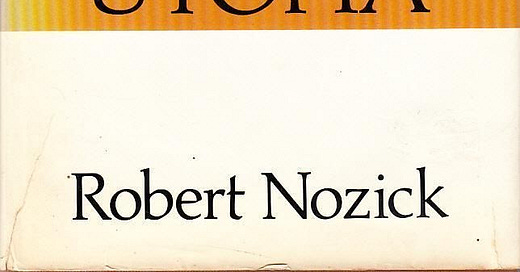Today I am beefing Robert Nozick.
Nozick was the handsome genius who wrote Anarchy, State, and Utopia, one of the best political philosophy books ever written.
In Justice, Gender, and the Family, feminist philosopher Susan Moller Okin completely violated Nozick by showing that his theory of property acquisition implies that mothers own their new-born babies, and may lock them in cages like birds.
According to Nozick, if you make something out of stuff that you own, you own the product as well. But as Okin points out, this commitment seems to butt heads with Nozick’s commitment to self-ownership: the belief that all people own their bodies and minds (unless, perhaps, they voluntarily sell themselves into slavery.)
Why? Well, when a mother gestates a baby, she grows its body — over nine months of bodily labour — out of stuff she presumably owns: her body, her food, her water, and so on. By Nozick’s theory of justice in initial acquisition, then, it looks like mothers straightforwardly own their children’s bodies: since mothers grow laboriously grow their babies out of stuff they own, at least in normal cases, Nozick’s unflinchingly broad principle that when you make something out of stuff you own, you own it, seems to imply that a dystopian matriarchy where mothers own their offspring and lock them in bird cages could very easily be just.
Surprisingly few libertarians have attempted to spell out what’s wrong with Okin’s argument, but those who have seem to take it pretty seriously. Consider this opening hedge from a recent paper by Walter Block and Michael Edelstein — two libertarian theorists — who try to grapple with Okin’s objection:
Even if libertarians can never nail this one down, this does not constitute an utter annihilation of this perspective. Other disciplines, too, do not have all the answers. For example, physicists do not know what occurred before the Big Bang, nor how it came to be. As well, they are still quarrelling over whether reality consists of waves or particles. Astronomers have not yet determined whether Pluto is a planet or not. There are unresolved issues, too, in economics, political science, sociology, chemistry, biology, as well. And, yet, these fields of study survive, quite nicely, without a full resolution of all issues. The same applies in the present case. Even if we cannot bat this one out of the park, libertarianism will still stand.
They conclude, in humility:
We do not fool ourselves into thinking we have nailed this conundrum. But the perfect is the enemy of the good, and this challenge is a convoluted one. We content ourselves in the thought that an imperfect attempt to solve a problem is better than none. It is perhaps a good first step in that direction. Hopefully, other writers will continue this process and improve the product, just as we have tried to stand on the shoulders of the scholars whose efforts we cite.
In between, Block and Edelstein suggest two “partial solutions” to Okin’s objection. They are called “partial solutions” because they don’t address the core, theoretical problem that Okin raises, but merely try to show that there would probably be fewer actual cases of mothers owning their children then one might initially expect (something Okin would be happy to grant.)
Keep reading with a 7-day free trial
Subscribe to Going Awol to keep reading this post and get 7 days of free access to the full post archives.





